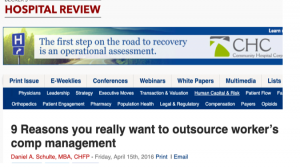Your systems, savings, capabilities, and results are better than the competition.
You know that because, well, it’s true. You’ve seen reports that show it’s true, been told that by your bosses, or some independent third party said so.
I cannot count the number of times I’ve heard “we save X to Y points more than the competition.” – or something just like that. One problem – your competitors believe the same thing. All of them. They’re wrong…right?
I heard it again at the National Council of Self Insurers’ meeting in Orlando yesterday – several times. When I demurred, my demurrals were rejected out of hand.
Allow me to burst your bubble.
Utilization review should be used to ensure the medical care delivered to patients is the right care, for that specific patient, by the right provider. In most cases, it is nothing of the sort. Rather, it is done to comply with regulations, generate revenue and is almost never integrated into billing.
Bill review is merely applying relevant regulations and fee schedule edits, sending bills to network vendors, and adding in some high-cost bill audits and perhaps retro UR and clinical audit.
Network selection doesn’t account for lower cost providers – it is based on discounts not net costs.
This is really basic stuff – and compared to what happens in group health it barely scratches the surface. Fact is medical providers are way more sophisticated than payers when it comes to coding, billing, and revenue management. There’s an entire industry devoted to revenue maximization for workers’ comp.

Data point – work comp represents about 1 percent of a health system’s revenue, but more than 10% of profits.
If you’re doing such a great job managing medical, why are providers making so much money off your patients?
With the exception of the Workers’ Comp Trust of Connecticut – I’ve NEVER seen a workers’ comp medical management program worthy of an A grade. In fact, the metrics most to evaluate program results are prima facie evidence the programs can’t be succeeding. Metrics like:
- savings below billed charges
- savings below fee schedule
- turn around time
- UR denials
- network penetration
are all process – not outcome – measures. And they measure the wrong things.
The right metrics include:
- medical cost by claim – case mix adjusted
- drug cost per claim
- time from date of injury to correct diagnosis
- disability duration – case mix adjusted – by provider and employer location
How am I so confident you’re not as good as you think?
I’ve audited dozens of programs and seen crappy data, inaccurate reporting, useless metrics, and poor analytical methodologies in almost all.
A fundamental problem in work comp medical management is complacency and an unwillingness to ask and demand answers to tough questions, borne out of today’s low medical expenses and continually dropping premiums. The result is many have grown fat and happy.
What does this mean for you?
You can do better. A lot better.



Joe:
I cannot help but wonder how many of your WC followers, after reading your first three paragraphs were compelled to continue to read your article to the very end to make sure their organization was not mentioned. Good points!
Hey Joe
Unfortunately they don’t know who they are…and wouldn’t agree if I said their employer is one of the companies in question.
I’d add that brokers and consultants could do a lot more to help employers focus in on the key issues. Lots of progress to be made.
Love your suggested “right metrics”, Joe – I think they’re spot on.
Hi Joe,
Well stated. So much more that can be done to help employers and employees! But that would involve more transparency (and honesty) to help employers measure the real VALUE of their partners.
Also, how do you propose to measure your metrics of:
(1) time from date of injury to correct diagnosis… (who determines “correct”)?
(2) disability duration …(modified RTW? full return to work? total indemnity costs? recidivism? other?)
There are a few smart employers beginning to ask tough questions.
Best,
Dick Turkanis, MD
Thanks for the shout out, Joe. We are very proud of our program and the successful outcomes we achieve for our clients.
My pleasure Diane. I calls ’em likes I sees ’em!